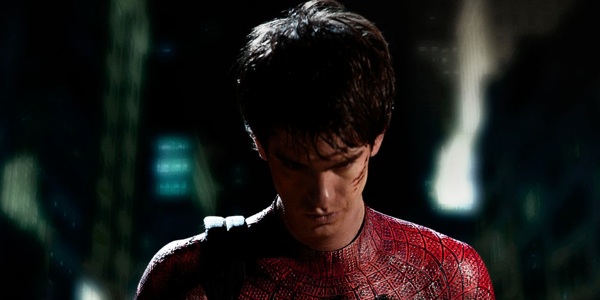2. Likeable Characters

I rather liked Maguires Spider-Man, but Andrew Garfield has taken it to another level. Sure it's slightly over-acted in places, but not only do he and Emma Stone provide the backbone to the film, what separates Spider-Man from Prometheus is that the characters are actually likeable. I dont recall caring even one bit about any of the two dimensional characters from Prometheus. Shaws muddled accent does little to add to her character (the fact she was supposed to be English and had an English coach on-set made the whole thing slightly distracting and off-putting) and neither does her questionable motives - "hey, this Engineer tried to kill us, let's go to a planet full of them!" Vickers and Fifield aren't at all likeable, Janek it a pretty awful Captain, and even David, who is by far the most popular character in the film with audiences as far as the general consensus goes, turns out to be a bad guy. Garfield and Stone both have an extremely natural quality to their acting skills, and both bought something to the film that, sadly, the cast of Prometheus could not: realism (I cant even look at a picture of Logan Marshall-Green without thinking about him the whiney, pouty Holloway in Prometheus and being reminded how glad I was when Vickers killed him). Additionally, some excellent casting in the shape of Martin Sheen, Denis Leary, and most significantly, Sally Field. The last thing we needed was another stereotypically old aunt with white hair in a bun and a pinny, and a throw back to Aunty Em from The Wizard of Oz. I was surprised by the casting of Sally Field, and hesitant to see her as Aunt May, but it paid off. She added a sense of realism to a character that previously I just could not connect with. Spider-Man has likeable characters, where Prometheus has nobody you can route for.
 I rather liked Maguires Spider-Man, but Andrew Garfield has taken it to another level. Sure it's slightly over-acted in places, but not only do he and Emma Stone provide the backbone to the film, what separates Spider-Man from Prometheus is that the characters are actually likeable. I dont recall caring even one bit about any of the two dimensional characters from Prometheus. Shaws muddled accent does little to add to her character (the fact she was supposed to be English and had an English coach on-set made the whole thing slightly distracting and off-putting) and neither does her questionable motives - "hey, this Engineer tried to kill us, let's go to a planet full of them!" Vickers and Fifield aren't at all likeable, Janek it a pretty awful Captain, and even David, who is by far the most popular character in the film with audiences as far as the general consensus goes, turns out to be a bad guy. Garfield and Stone both have an extremely natural quality to their acting skills, and both bought something to the film that, sadly, the cast of Prometheus could not: realism (I cant even look at a picture of Logan Marshall-Green without thinking about him the whiney, pouty Holloway in Prometheus and being reminded how glad I was when Vickers killed him). Additionally, some excellent casting in the shape of Martin Sheen, Denis Leary, and most significantly, Sally Field. The last thing we needed was another stereotypically old aunt with white hair in a bun and a pinny, and a throw back to Aunty Em from The Wizard of Oz. I was surprised by the casting of Sally Field, and hesitant to see her as Aunt May, but it paid off. She added a sense of realism to a character that previously I just could not connect with. Spider-Man has likeable characters, where Prometheus has nobody you can route for.
I rather liked Maguires Spider-Man, but Andrew Garfield has taken it to another level. Sure it's slightly over-acted in places, but not only do he and Emma Stone provide the backbone to the film, what separates Spider-Man from Prometheus is that the characters are actually likeable. I dont recall caring even one bit about any of the two dimensional characters from Prometheus. Shaws muddled accent does little to add to her character (the fact she was supposed to be English and had an English coach on-set made the whole thing slightly distracting and off-putting) and neither does her questionable motives - "hey, this Engineer tried to kill us, let's go to a planet full of them!" Vickers and Fifield aren't at all likeable, Janek it a pretty awful Captain, and even David, who is by far the most popular character in the film with audiences as far as the general consensus goes, turns out to be a bad guy. Garfield and Stone both have an extremely natural quality to their acting skills, and both bought something to the film that, sadly, the cast of Prometheus could not: realism (I cant even look at a picture of Logan Marshall-Green without thinking about him the whiney, pouty Holloway in Prometheus and being reminded how glad I was when Vickers killed him). Additionally, some excellent casting in the shape of Martin Sheen, Denis Leary, and most significantly, Sally Field. The last thing we needed was another stereotypically old aunt with white hair in a bun and a pinny, and a throw back to Aunty Em from The Wizard of Oz. I was surprised by the casting of Sally Field, and hesitant to see her as Aunt May, but it paid off. She added a sense of realism to a character that previously I just could not connect with. Spider-Man has likeable characters, where Prometheus has nobody you can route for.